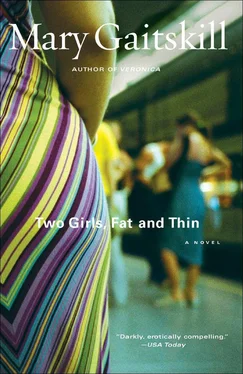Mary Gaitskill - Two Girls, Fat and Thin
Здесь есть возможность читать онлайн «Mary Gaitskill - Two Girls, Fat and Thin» весь текст электронной книги совершенно бесплатно (целиком полную версию без сокращений). В некоторых случаях можно слушать аудио, скачать через торрент в формате fb2 и присутствует краткое содержание. Год выпуска: 2012, Издательство: Simon & Schuster, Жанр: Современная проза, на английском языке. Описание произведения, (предисловие) а так же отзывы посетителей доступны на портале библиотеки ЛибКат.
- Название:Two Girls, Fat and Thin
- Автор:
- Издательство:Simon & Schuster
- Жанр:
- Год:2012
- ISBN:нет данных
- Рейтинг книги:5 / 5. Голосов: 1
-
Избранное:Добавить в избранное
- Отзывы:
-
Ваша оценка:
- 100
- 1
- 2
- 3
- 4
- 5
Two Girls, Fat and Thin: краткое содержание, описание и аннотация
Предлагаем к чтению аннотацию, описание, краткое содержание или предисловие (зависит от того, что написал сам автор книги «Two Girls, Fat and Thin»). Если вы не нашли необходимую информацию о книге — напишите в комментариях, мы постараемся отыскать её.
Review) create a haunting and unforgettable journey into the dark side of contemporary life and the deepest recesses of the soul.
Two Girls, Fat and Thin — читать онлайн бесплатно полную книгу (весь текст) целиком
Ниже представлен текст книги, разбитый по страницам. Система сохранения места последней прочитанной страницы, позволяет с удобством читать онлайн бесплатно книгу «Two Girls, Fat and Thin», без необходимости каждый раз заново искать на чём Вы остановились. Поставьте закладку, и сможете в любой момент перейти на страницу, на которой закончили чтение.
Интервал:
Закладка:
“What happens to Skip Jackson?”
“He gets to the paradise with the others and then comes back in the end to take over the world.” She worked the knobs of the machine. “Plus there’s some romance and some sex.”
“That sounds interesting. That sounds like something I might like to read. I haven’t read for years now.”
“I told Skip Johnson he reminded me of Skip Jackson in The Gods Disdained ,” she said to Glenda that afternoon.
“Ah, what a compliment.”
“Now he’s probably going to read it and think I have a crush on him.”
Glenda laughed throatily. “You know, he really isn’t anything like the character. Do you know he is forty-five years old and he lives with his mother?”
“Oh my.”
“That’s right. His mother is Regina Johnson who comes in about every six months. She is really the mover and shaker of the family. She still manages a floor of Bloomingdale’s and she is sixty-seven years old.”
“That’s wonderful.”
Justine filed patients’ cards and brooded. According to Definitist thought, for every imperfect entity, be it human or material, there exists a perfect counterpart; a lovely princess for every pimply shop girl. This perfection was not an annulment of the shop girl, but an ideal for her to aspire to, and the clerk who whistled at her in the street could see and love the princess in her, just as she could see the glamorous playboy in him. That is why, said Anna Granite, advertising is deeply moral; its smiling billboards are openings into the perfect beauty that we can all strive for and attain, to one degree or another, depending on our individual components.
Maybe, thought Justine bleakly, there is a perfect Justine Shade somewhere. A tall, full-lipped beauty who wears silk and leather. She lives in a beautiful, austere apartment and condescends to write a half-dozen or so brilliant pieces of journalism a year. They all sound the same, and they are never ambiguous. She has lilac-point Siamese cats and a few strong, handsome, powerful lovers who never stand her up or make her feel awful, instead of a series of eccentrics, instead of a tiny apartment filled with gewgaws and balls of dirt, instead of a job putting clamps on old people and arranging cards in alphabetical order.
This can’t go on, she thought. Somehow, I have to get out and Live.
On the other hand, Anna Granite’s heroines rarely got out and Lived. They didn’t want to either, as it would require that they mix with the herd. They just worked hard at their careers, thought, and were beautiful in grand, square-jawed isolation, at least until the hero appeared who had also, until this point, been sitting alone in his room when he wasn’t working hard. Perhaps there was something starkly beautiful about her simple job and her functional apartment, her daily subway ride, her small bags of groceries and neat dinners, her staring vigils over the clanking typewriter. It was possible, except there was nothing stark or beautiful about the gewgaws or the dirtballs. Maybe she would begin sweeping more regularly and throw some things out.
“How is the article coming?” asked Glenda.
“I’m making progress. I’m interviewing people this afternoon, these guys who run a Definitist school.”
“That should be interesting,” said Glenda, absently examining a postcard from a forgotten patient.
“And I’m trying to arrange an interview with Austin Heller next week.”
“Really?” Glenda looked at her with tentative reappraisal. “That would be a feather in your cap, wouldn’t it?”
“I don’t know. He probably won’t understand why anybody would be interested in Anna Granite now. He might not have anything to say.”
“But still, just to mention his name in your article.”
Justine crouched on the slim ledge of Glenda’s validation, her enjoyment of the perch only partially marred by its smallness and flimsiness.
The offices of Rationalist Reaffirmation High were located in a small oblong apartment building in Brooklyn. The third floor stairwell had “You Die” written in Spanish on its wall.
Jack Peach, president of Reaffirmation High, was a plump fellow with a proud fleshy chest and a normal smile. He shook her hand and guided her through the functional apartment, which was defined by boxes of files, a desk layered with organized paper, and a glowering answering machine. She sat in a small chair with a vinyl seat and arranged her notebook. “My partner will be joining us in a few minutes,” he said. “I hope you don’t mind the mess.”
She said no and studied the room, its stacks of cardboard files, its blankets rolled on the saggy twin beds, the little bundle of folded socks on the dresser. She imagined two men waking up every morning in this room, walking around in their underwear, drinking coffee, preparing to go and spread Definitism into the world.
“Our office is a little unorthodox,” said Jack Peach, seating himself on a folding chair. “Especially for me. Just two years ago, I had an office that was almost as big as this apartment. I had a lovely view of Manhattan and New Jersey.”
“What were you doing then?”
“I was a corporate lawyer at Moose Grimm.” He grinned proudly. “Quite a change of life-style, wouldn’t you say?”
The door opened and a slight man with glasses on the end of his nose entered carrying a box of pizza and a brown grocery bag.
“But it’s worth it for the school,” said Jack. “The school’s the most important thing in my life right now. This is my partner, Dave Fry.”
The slender man tugged shyly at the bottom of his suit jacket, nodded, and said, “Hello.”
“Would you like some pizza?” asked Jack courteously.
She said no; there was food arranging and jacket removing. Jack gave her a can of diet root beer, and he and Dave sat down to their dinner with an air of gracious ease. Dave picked up his little can of carbonation and fervently began. “I. ” but Jack cut him off.
“I first conceived of making Definitism the dominant philosophy in our time when I was at Princeton studying economics, and I noticed how two conflicting attitudes towards making money and building commerce were gnawing at the minds of the students. On one hand they were being given the best education that money could buy, the best training to go into business that anyone could have — and on the other, they were being subtly told that what they were doing was somehow base, greedy, even immoral. I saw a dangerous and horribly cruel cultural schizophrenia that needed to be cured with reason. And that’s why I started the school.”
“Education should make sense,” burst out Dave. “It should be about thinking, writing, and speaking within the parameters of logic.”
“We had certain problems with the state at first,” confided Jack. “We did break a few bureaucratic-type rules. But how could they say ‘no’ to a high school staffed by teachers who all have such advanced degrees?” He beamed sweetly.
“Can I say something?” asked Dave Fry.
“Sure,” said Jack. “I just. ”
“The bottom line of leftist thought is that individuals cannot know reality or truth, that there is no objective truth. If there is no objective truth, then everything is excused. If we cannot know reality, then to act and build is futile. If an individual is just a collection of neurons and genes, or a receptacle for whatever environmental data that’s input, then he isn’t responsible for himself. In a world like this, everything’s on the same level, whether it’s a Bach sonata or a papier mâché pig made by a retarded kid. Everybody’s on the same level; you’re supposed to care as much or more about thousands of Vietnamese strangers as you would about your own family. In a world like this, what can you value or turn to but the approval and love of other people— any other people?”
Читать дальшеИнтервал:
Закладка:
Похожие книги на «Two Girls, Fat and Thin»
Представляем Вашему вниманию похожие книги на «Two Girls, Fat and Thin» списком для выбора. Мы отобрали схожую по названию и смыслу литературу в надежде предоставить читателям больше вариантов отыскать новые, интересные, ещё непрочитанные произведения.
Обсуждение, отзывы о книге «Two Girls, Fat and Thin» и просто собственные мнения читателей. Оставьте ваши комментарии, напишите, что Вы думаете о произведении, его смысле или главных героях. Укажите что конкретно понравилось, а что нет, и почему Вы так считаете.












